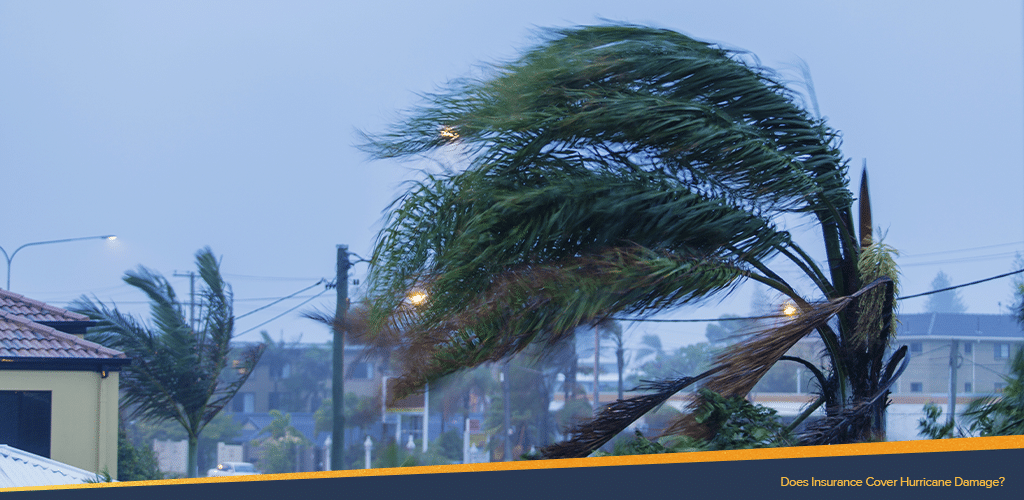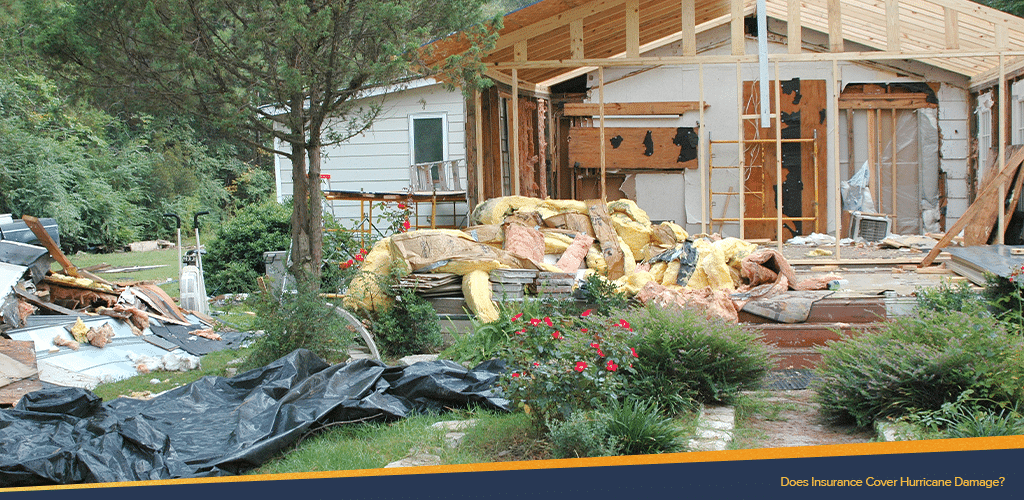
You pay your premiums year after year—but when a hurricane strikes, will your insurance actually cover the damage? It’s a question many homeowners across the USA must face.
Understanding your policy and how hurricane damage is treated by insurers can mean the difference between rebuilding and financial ruin. So, does insurance cover hurricane damage? The answer is: it depends.
Key Takeaways
- Insurance Coverage: Homeowners insurance covers wind damage but not flooding. Separate flood and windstorm policies are needed for full protection.
- Hurricane Deductibles: Special hurricane deductibles in Texas and Louisiana can be a percentage of your home’s value, requiring significant out-of-pocket costs before coverage starts.
- Claim Documentation: After a hurricane, document all damage, make temporary repairs, and notify your insurer quickly to avoid claim delays.
- Claim Denials: If your hurricane claim is denied or underpaid, Daly & Black can help fight for the compensation you deserve.
- Full Protection: For complete coverage, you need homeowners, windstorm, and flood insurance. Daly & Black ensures insurers honor your policies.
Does Insurance Cover Hurricane Damage?
In most cases, standard homeowners insurance covers some hurricane-related damage—but rarely all of it. The key is how the damage is categorized:
- Wind Damage: Typically covered under most homeowners policies. This includes roof damage, broken windows, and structural harm caused by high winds.
- Flood Damage: Almost always excluded from standard policies. If your home floods due to storm surge or heavy rain, you’ll need separate flood insurance to be protected.
- Rain Damage: If wind damages your roof or windows and rain gets in as a result, the resulting interior damage is usually covered.
Deductibles Matter
Both Texas and Louisiana policies often include special hurricane or windstorm deductibles. These are separate from your standard deductible and are usually calculated as a percentage (2% to 5%) of your home’s insured value—not a flat dollar amount. That can mean thousands out of pocket before coverage kicks in.
What Type of Insurance Do You Need for Full Hurricane Protection?
To truly be protected from every angle during a hurricane, you need to stack your coverage.
Homeowners Insurance
Covers wind-related structural damage, fallen trees, and personal belongings—but not flooding.
Windstorm Insurance
In coastal Texas, policies often exclude wind damage unless you purchase separate windstorm coverage through the Texas Windstorm Insurance Association (TWIA). In Louisiana, Louisiana Citizens Property Insurance Corporation provides similar coverage for high-risk areas.
Flood Insurance
Flooding is the most common source of hurricane damage—and it’s typically not covered unless you have a policy from the National Flood Insurance Program (NFIP) or a private insurer.
What’s Commonly Excluded from Hurricane Coverage?
Many homeowners assume they’re fully covered, but gaps in coverage are common. Here’s what may be excluded:
- Flood damage (without a flood policy)
- Mold remediation, unless directly caused by a covered peril
- Sewer backup
- Detached structures or outdoor items not documented
- Living expenses during repairs if not specifically included in your policy
Always read the fine print and ask your insurance agent to walk you through the exclusions before the next storm hits.
How to File an Insurance Claim After a Hurricane
Filing a hurricane damage claim correctly is key to maximizing your recovery. Both the Louisiana Department of Insurance (LDI) and the Texas Department of Insurance (TDI) offer guidelines that every policyholder should follow after a major storm. Here’s how to take the right steps:
Document the Damage
As soon as it is safe, document everything. Take photos and videos of all damage, both inside and outside your property. According to the LDI, thorough visual documentation is critical to validating your losses.
Prevent Further Damage
Make temporary repairs to protect your home from additional harm. Tarp your roof, board up windows, and shut off water or gas lines if needed. TDI emphasizes that most policies require policyholders to mitigate further damage, or future claims may be denied.
Notify Your Insurer
Report your claim as soon as possible. Contact your insurer through their emergency hotline, website, or mobile app. LDI advises having your policy number ready and writing down the claim number and representative’s name for reference.
Keep Track of Expenses
Save all receipts for emergency repairs, hotel stays, food, and replacement items. TDI recommends keeping a dedicated folder or digital record to track these expenses, which may be reimbursable under your policy.
Review Your Policy
Request a copy of your full policy and read it carefully. Look for coverage limits, exclusions, and your deductible responsibilities. If you’re unsure how to interpret it, consider reaching out to an attorney for help. Both TDI and LDI stress the importance of understanding your rights before settling.
Insurance adjusters may undervalue or delay your claim. Know your rights—and remember, Daly & Black is here to help if your insurer doesn’t play fair.
Hurricane Damage by the Numbers
According to the National Oceanic and Atmospheric Administration (NOAA), hurricanes are among the costliest natural disasters in the United States.
NOAA’s Billion-Dollar Weather and Climate Disasters report shows that in 2023 alone, the U.S. faced 28 separate billion-dollar disasters, amounting to over $92.9 billion in total damages—with several major events linked directly to hurricanes and tropical cyclones.
This data underscores the staggering financial impact these storms can have on homes, businesses, and entire communities.
The Federal Emergency Management Agency (FEMA) reports that just 1 inch of floodwater in a home can result in over $25,000 in damage, emphasizing the critical need for flood insurance coverage.
For residents of Texas and Louisiana—two of the most hurricane-prone states in the country—these statistics are more than numbers; they’re a warning. Without layered insurance coverage and aggressive legal support, recovering from a storm can become nearly impossible.
What If Your Hurricane Damage Claim Is Denied?

Unfortunately, insurance companies use a wide range of tactics to avoid paying full value on hurricane damage claims. Common excuses include:
- Claiming damage was pre-existing
- Arguing flood—not wind—was the cause
- Alleging policy violations or late filing
If your hurricane damage claim is denied or lowballed, it’s time to bring in a hurricane damage claim lawyer. At Daly & Black, we don’t play games. We investigate, build a rock-solid case, and take the fight to the insurers—so you can rebuild and move forward.
Why Choose Daly & Black, P.C.
We’ve been named Insurance Litigation Firm of the Year and built a reputation for fighting, and winning, against powerful insurance companies. We don’t just dabble in hurricane cases, we go ALL IN. ALL THE TIME.
Whether you’re in Houston, New Orleans, or anywhere in between, Daly & Black is ready to:
- Evaluate your denied or underpaid claim
- Handle communications with your insurer
- Fight for every dollar you’re owed
We proudly serve policyholders throughout Texas and Louisiana—and we don’t back down.
Ready to Fight Back After a Hurricane?
So, does insurance cover hurricane damage? It depends on your policy and whether your insurer plays fair. The reality is, most homeowners in Texas and Louisiana need multiple policies to be fully protected and when insurance companies deny, delay, or underpay, Daly & Black, P.C. is ready to step in.
FAQ
Does homeowners insurance cover hurricane damage?
It depends. Most homeowners insurance covers wind damage, but not flooding. You’ll need separate windstorm or flood insurance for full protection.
What type of insurance do I need for full hurricane protection?
You’ll need three layers of coverage: homeowners insurance, windstorm insurance (like TWIA or Louisiana Citizens), and flood insurance through NFIP or a private carrier.
What should I do if my hurricane damage claim is denied?
Contact a hurricane damage lawyer immediately. Daly & Black can evaluate your claim, handle insurer negotiations, and fight for what you’re owed.
